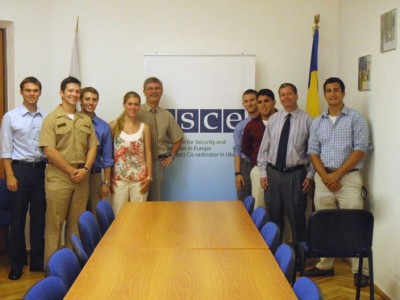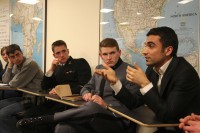Research

|
|
EPIIC Research
EPIIC also provides for unusual opportunities for students to conduct research related to its annual theme, both at home and abroad. Last year students traveled to Bangladesh, India, Nepal, Sri Lanka and within the US. More than 800 students have traveled to more than 80 countries since 1986.
You will have potential opportunities to pursue sponsored independent research whether at the Argonne Argonne National Laboratory; The Carnegie Institution for Science; the Belfer Center for Science and Technology at Harvard University; and Quaid-e-Azam University, Islamabad, Pakistan.
Potential topics students can explore this year include: the security implications of China’s nuclear energy expansion; the debate over the intelligence failures on Iraq weapons of mass destruction; the impact of the worldwide nuclear disarmament movement; inequality in the nuclear nonproliferation regime; the politics behind the Congressional verification of arms control agreements, as in the contentious debate over replacing the 1991 Strategic Arms Reduction Treaty; the science behind the ability to identify the source of a nuclear weapon (“nuclear attribution”); the black market nuclear network of the Pakistani physicist Abdul Qadeer Khan; Israel’s nuclear deterrent posture; the contentious litigation over Yucca Mountain, the proposed site of US’s primary nuclear waste repository; can nuclear energy and non-proliferation co-exist; the assertion that nuclear energy can emerge as a solution to the twin crises of global warming and a secure energy source; how has deterrence theory and reality have changed since MAD (Mutual Assured Destruction); the doctrine of the “Prompt Global Strike”; the vulnerability of the United States to an electromagnetic pulse (EMP) attack
International Students and EPIIC
 There is also the opportunity to develop research ideas together with international students from the Institute’s TILIP (Tufts Initiative for Leadership and International Perspective) program. Last year, EPIIC brought 50 students from Afghanistan, China, Israel, Iraq, Japan, Pakistan, Singapore, and South Korea to participate in its symposium. This year, we plan to add delegations from Brazil, England, France, and Russia.
There is also the opportunity to develop research ideas together with international students from the Institute’s TILIP (Tufts Initiative for Leadership and International Perspective) program. Last year, EPIIC brought 50 students from Afghanistan, China, Israel, Iraq, Japan, Pakistan, Singapore, and South Korea to participate in its symposium. This year, we plan to add delegations from Brazil, England, France, and Russia.
Representatives from Iraq and ALLIES shown at left

